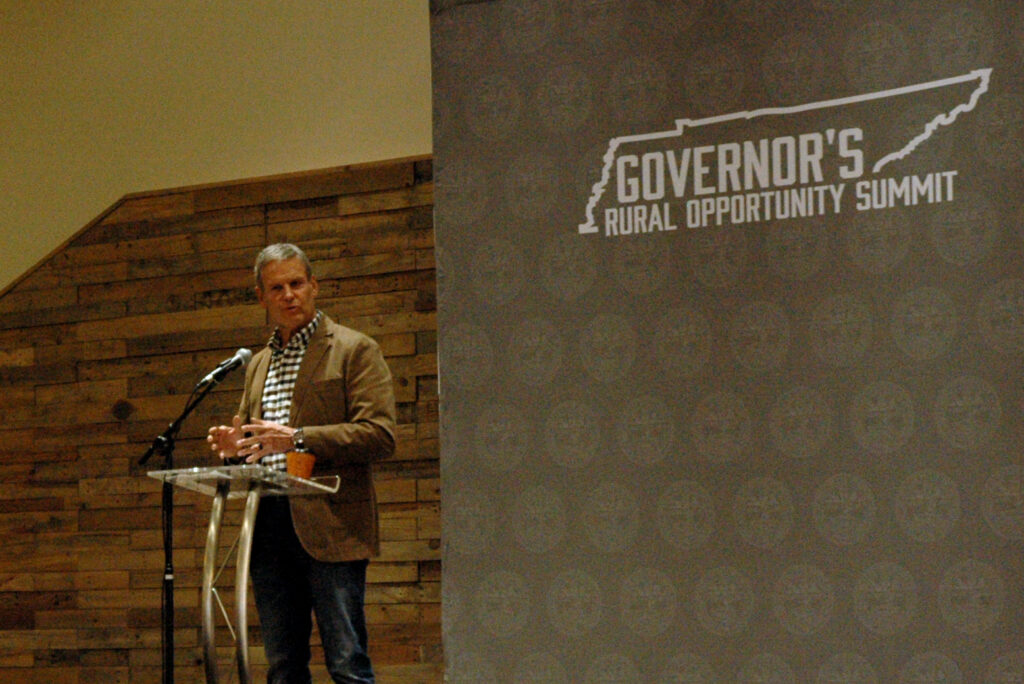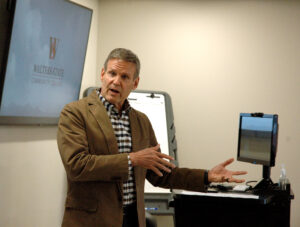NEWPORT, Tenn.—Leaders from rural, distressed, and at-risk counties gathered at the Carson Springs Baptist Conference Center on Friday, November 19 for the Governor’s Rural Opportunity Summit to discuss the revitalization of rural communities.

The annual meeting began in 2019 with the stated goal of improving the economic conditions of Tennessee’s rural communities. Because COVID prevented the summit last year, the Friday gathering was the second event of its kind.
During his visit to Cocke County, Gov. Bill Lee spoke at the summit, and toured the Tanner Building in Newport, where Walters State Community College added a campus in August 2020.
Deputy Chief of Staff to the governor Alec Richardson said there were two summits this year, split into east and west, with the goal of exchanging ideas between the state cabinet and local governments.
“We can’t do it without you guys on the ground, with everyday people, to try to make this work,” he said, speaking to a room of about 150 people. “The governor’s goal is to get rid of all distressed counties and make sure at-risk and distressed have as many opportunities as the transitional and the attainment counties that we have.”
Lee said he grew up in a rural community and does not want to see it lost, as he appreciates the lifestyle that counties like Cocke County provide for more than half the state. He rejects the opinion that rural America must be in a state of decline and said investment in those communities is key to elevating distressed counties.
“I think it’s difficult,” he said. “I think it’s challenging. I think there’s a lot of work that we have to do there, but it is worth it if we want to maintain all that is wonderful about our state.”

He said since taking office, he has seen Tennessee’s number of distressed counties shrink from 15 to nine, indicating that the state is heading in the right direction, but the summit is an opportunity to address the continuing problems of counties faced with job losses or stagnant economies.
“We’re not going to fix anything today,” he said, “but what we’re doing is opening lines of communication, knowing who one another are in a better way, networking with people that can partner together for you to make improvements for the people that you serve.”
Cocke County Mayor Crystal Ottinger said the summit gave her an opportunity to meet commissioners, and hear what they hope to do for rural and distressed communities.
When it was her turn to speak with commissioners, she was asked what keeps her up at night, and what the state could do for communities, to which Ottinger responded that lots of time is spent evaluating communities, but there is not much action once evaluations are over.
“We have a lot of binders with plans and evaluations, where we are, and where we want to be,” she said, “but then they stop right there, and we’re not seeing that last bit of action to implement things and change things. That’s what I’m really hoping to see.”
Ottinger says the main thing standing between planning and action on county goals is funding.
“We do have this ARP money coming,” she said, referring to federal money from the American Rescue Plan. “We are seeing some things change, so let’s go past the planning, past the evaluation, and let’s do some action items.”
She said during the summit she talked about grants that would help the county, but require a match.
“When you live in a county with a high poverty rate, that’s distressed – economically challenged – it’s hard to meet those matches,” Ottinger said. “You want to make sure whatever money you’re spending is spent properly, and not going to be something that sits on a shelf.”
Many grants have a match, she said, and the grants usually will not provide 100% funding. Some matches may be 25%, for example, or some may offer a 50-50 match, but in most cases the county has to put up a specified amount in order to receive the grants.
“Sometimes we don’t have that, so we talked to them about possibly having no-match grants or letting us use other moneys, whatever that may look like,” she said. “Some of our sales tax revenue that would normally go to the state, we would like to see maybe a little less of that go toward the state’s general coffers, and maybe give some of that back to the distressed counties.”
She said because Cocke County and others have been unable to meet those matches, the Association of County Mayors has tried, with no success, to sell the General Assembly on the idea of giving back some tax revenue in the form of grants, or money to match other grants.
“Right now, it would be nice to be able to utilize some of that to get more done for our communities,” Ottinger said.
She said that she had expressed this desire again, during a panel discussion, where she was met with silence. She laughed and said she understood they were not expecting such a direct question, and would need to evaluate the outcome.
“I think myself, and some of the other mayors that were there – having discussed this for a few years now – would have been a lot happier if they said, ‘Well yeah, we’ve been thinking about doing just that!’ But we weren’t discouraged,” Ottinger said, “because having that door of communication open, with the possibilities, has been really good for us. The governor has been good to listen on things like that.”
Ottinger said when she received economic data for Cocke County from the Appalachian Region Commission in 2019, she was informed by the state that if they repeated that improvement in 2020, then the county would have been on its way off the distressed list.
“Of course, then COVID hit,” she said, “and Conagra decided to shut down, so we are not as close as we were in 2019 to being off that list, but we’re still working toward our goals, and what we do need to do to get off the distressed list.”
During the summit, Ottinger had an opportunity to engage with the commissioners of health, workforce development, tourism, agriculture, and education.
“Workforce is a big issue,” she said. “They talked about dislocated worker opportunities.”
Ottinger said she wants an American Job Center in Cocke County, so that people do not have to drive to another county to receive benefits.
“They’re going to follow up and see what that would look like, to see if it’s a possibility,” she said.
Ottinger said the Commissioner of Health asked about any setbacks she has identified, or issues needing evaluation.
“We talked about the lack of nurses and paramedics,” she said. “We know that some other states are giving bonuses and things like that if people will become travel nurses and go down there, so I wanted to know if the state was going to do something similar. Are they getting bonuses? What are they doing?”
Ottinger said they told her they are not looking at bonuses, but the state is considering paying for school to give Tennessee an advantage, to help keep medical staff in place.

Addressing students in a Walters State classroom at the Tanner Building in Newport, Lee said he wanted to remind the students in attendance, and leaders in the room, what the day is about. He said the revitalization and investment efforts being discussed at the summit, along with coordination between state and local governments in general, are to the students’ benefit, upon whom Tennessee depends for a better future.
“That is what this is about, is creating an environment where you can be successful, and where you can get your education more efficiently at lower cost where you don’t have a bunch of debt when you get out of school,” he said. “I see all these leaders in the room who are reminded this is really about you. So thanks for taking advantage of it and for pursuing the opportunity.”
Ottinger said she is happy the governor and his aides got to see Newport on a sunny day to experience what Cocke County has to offer. She said while the governor, his cabinet and staff were in town, they visited businesses, ate at local restaurants, and planned to return.
“Cocke County showed up and showed out,” she said. “They couldn’t have been more impressed with the folks they met and the places they went.”
Ottinger said she is confident in her ability to continue to guide policy, and assist with keeping ARP goals on track as she nears the end of her term next year.
This story appeared in The Newport Plain Talk.

